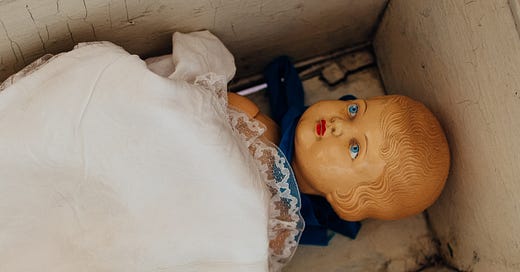ROCK PAPER RADIO is a dispatch for misfits & unlikely optimists by your favorite hapa haole, beet-pickling, public radio nerd. It’s a weekly email newsletter and podcast that shares three curiosities every Thursday - something to hold on to (that’s the ‘rock’), something to read (that’s the ‘paper‘), and something to listen to (you guessed it, that’s the ‘radio’). Themes include but are not limited to: rebel violinists, immortal jellyfish, revolution. Thanks for subscribing and spreading the word. Learn more at RockPaperRadio.com.

SOMETHING TO LISTEN TO
Happy first Mothers’ Day (yep, that apostrophe is after the s*) to Democratic state senate candidate of Minnesota Erin Maye Quade who recently delivered a convention speech while in active labor. What’s more impressive—fighting on the campaign trail while literally giving birth, or surviving teenagehood relatively unscathed? There’s no way to know! But I know this is true for sure: if it takes a village to raise a child; it takes an entire education system, a network of cross-country aunties and uncles, and a co-parent with the organization skills of Marie Kondo-meets-American Psycho to raise a teenager.
Jessica Robinson definitely didn’t have the support system she needed around her as a child, but she found one in an unlikely place as a teen. At just 14-years-old, she was sent to adult prison to carry out a 9 year sentence for armed robbery and kidnapping in Florida.
In Are you my mommy?, This American Life reporter Alex Kotlowitz tells the 21-minute story of how Robinson’s fellow adult inmates became the only caring family she had ever had. These women, many of them with children of their own on the outside, were serving time for crimes ranging from embezzlement to murder. Under their care, and against many prison rules, Robinson was pulled out of fights, read to, hugged.
This story is as much about the need for a compassionate justice system, as it is a quietly powerful nod to the fact that people are fascinatingly complicated and capable of so much more than the worst thing they’ve ever done.
SOMETHING TO READ
The summer I turned 21, I interned for Mass NARAL. My intern duties included training canvassers on how to strike up a conversation about women’s healthcare with busy commuters in front of Dunkin’ Donuts, and organizing community conversations around how neither the pro- or anti-choice movements are actually about babies. Later, back in Seattle, I worked for Washington NARAL and learned that cold calling strangers to ask them for money—even for a cause I deeply believe in—is, in fact, my worst nightmare.
That’s all to say that when I came across this Who Gets Abortions in America? report from The New York Times a few months ago, I thought I was pretty well versed in this topic. The findings surprised me. Some takeaways:
the number of abortions performed in the U.S. have been steadily declining since the 1970’s
60% of women who get an abortion already have at least one child
most women (41%) who get an abortion have attended some college
most women (49%) who get an abortion are living below the poverty line
most women (58%) who get an abortion have not had a previous abortion
most women (46%) who get an abortion are single and have never been married
most women (57%) who get an abortion are in their 20’s, with most of those women in their late 20’s
Since the Supreme Court draft opinion overturning Roe v. Wade was leaked on Tuesday, women have been taking to social media to share stories where their lives were saved by having autonomy over their bodies.

Combined with those personal narratives, data-focused reports like this are a powerful reminder of the people (in this case, educated, 20-something single mothers experiencing poverty) who will continue to be crushed under the weight of this issue long after everyone else has moved on to the next Madison Cawthorn scandal or TikTok dance. Spread the word.
SOMETHING TO HOLD ON TO
Bangladeshi artist Tayeba Begum Lipi gets it that the personal is necessarily political. The female body and life on the margins are primary themes in her work.


Lipi’s sculptures use safety pins and razor blades to depict everyday intimate objects such as beds, strollers, bras and underwear. According to the Sundaram Tagore Gallery, the artist’s “purposeful and provocative choice of materials speaks to the violence facing women in Bangladesh, as well as referencing tools used in childbirth in the more underdeveloped parts of the country.”
Learn more about Lipi and and see her sharply beautiful yet unsettling work here.
SHOUT OUT TO MOMS
That’s a wrap on issue 81, friends. Thanks for reading, listening, holding on.
It’s Mother’s Day this weekend (*or, Mothers’ Day for lesbian moms) so in addition to calling our own moms, I also suggest that we all reach out to the women in our lives (and our kids’ lives) who are doing the kinds of maternal work that doesn’t get its own holiday—step moms, teachers, nurses, aunties, coaches, caregiving inmates—whoever deserves some love and acknowledgement as we plow through this third pandemic year still looking for our village.
See you next Thursday.
K.



